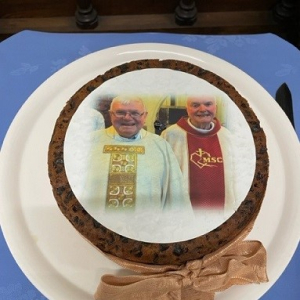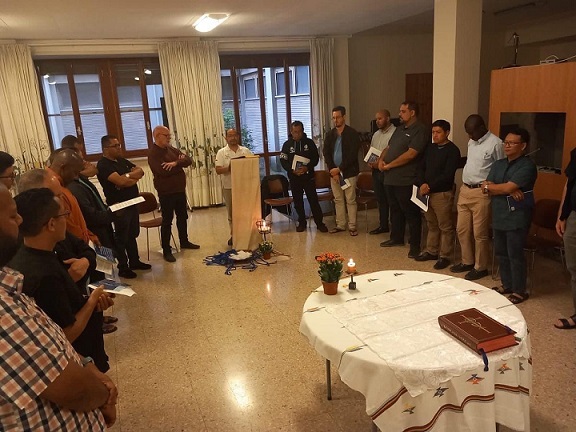Peter MALONE
The Voice - for reflection, for the weekend
The Voice - for reflection, for the weekend

This week a poll suggested that support for the Voice has lessened. And, this week the AFL came out in support of the Voice. Our Chapter voted in support of the Voice. Tim Brennan has sent an article by Gareth Evans which offers some thinking on the issues. Here are some excerpts for weekend cocnsideration:
First, the Chapter resolution:
- We Missionaries of the Sacred Heart of Jesus welcome the opportunity to support the Uluru Statement from the Heart, and the desire of First Nations Peoples to have a Voice that will be acknowledged and listened to, enshrined in the Australian Constitution.

At the heart of the case for the Voice is that it will mean Indigenous Australians will be recognised – for the first time in our founding national document, and for the first time in practice on anything like this scale – not just as the subjects, for better or worse, of government policy choices, but as agents of policy change, contributing actively to legislative and executive decision-making.

The product of an extraordinarily comprehensive national consultative process culminating in the Uluru Statement from the Heart, the Voice deserves none of the sniping it has received from either some perennially disaffected members of the Indigenous community itself, or from familiar conservative political voices. Of course, it will not by itself deliver the well-crafted, well-financed, health, education, welfare and employment programs still so desperately needed. But it is a means to that end, not a distraction from it.

But this worry dissolves when looks also at the actual draft constitutional text which will, as currently proposed, accompany it on the ballot paper:
- There shall be a body, to be called the Aboriginal and Torres Strait Islander Voice.
- The Aboriginal and Torres Strait Islander Voice may make representations to Parliament and the Executive Government on matters relating to Aboriginal and Torres Strait Islander peoples.
- The Parliament shall, subject to this Constitution, have power to make laws with respect to the composition, functions, powers and procedures of the Aboriginal and Torres Strait Islander Voice.

We need to do that not grudgingly but with the kind of sensitivity so trenchantly articulated by Paul Keating in his Redfern address. As he said, “it was we who did the dispossessing. We took the traditional lands and smashed the traditional way of life. We brought the diseases. The alcohol. We committed the murders. We took the children from their mothers. We practised discrimination and exclusion. It was our ignorance and our prejudice. And our failure to imagine these things being done to us.” Even Tony Abbott acknowledged that this “movingly evoked…the stain on our soul”.
None of this means abandoning our critical faculties. None of it means sacrificing reason to sentiment. None of it means giving rewards and benefits to individuals irrespective of their needs and deserts. None of it will automatically translate into more effective government programs. But what it does mean is non-Indigenous Australians listening, as we have never seriously listened before, to what our Indigenous brothers and sisters have long being trying to tell us. That we do owe a very special debt to the first Australians. And we can do much better than we ever have before in discharging that debt. By listening – really listening – to their Voice.

Gareth Evans, ALP minister, former Senator, Chancellor ANU, author.

Bank of Dave
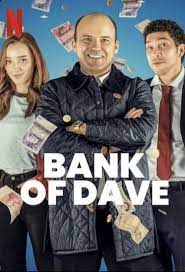
BANK OF DAVE
UK, 2023, 108 minutes, Colour.
Joel Fry, Rory Kinnear, Phoebe Dynevor, Jo Hartley, Angus Wright, Cathy Tyson, Paul Kaye, Hugh Bonneville, Def Leppard.
Directed by Chris Foggin.
It looks like something of a corny title! In fact, this is a true story, although there is a caution at the beginning that it is true-ish. In fact, the campaign was actually Bank on Dave (which is friends always could).
While watching Bank of Dave, this reviewer’s mind went back 70 years, to the 1950s, to the Ealing Studios comedies, so many of them with Alec Guinness, certainly the touch of humour, but so often dealing with social problems, the problems of ordinary people, films like The Man in the White Suit. But audience memories may not go back that far. Perhaps another point of reference would be the later 1990s, with films like Brassed Off, The Full Monty.
This is definitely a film about ordinary people but people with a strong sense of community – and Dave makes quite a number of speeches throughout the film emphasising this theme.
And, we might wonder if we did not know that actual story or seen the documentary about him, who is Dave? He comes from Burnley, a northern town, Lancashire, far from the minds of London and London far from Burnley’s mind! Dave had a garage and sold vans and minibuses. But, with the sense of community, with his wife, he has built up his finances and has been making loans to people in need, to pay debts, to start businesses. His very popular in the town and, as played exuberantly by Rory Kinnear, vigorous singing as well, karaoke in the pub with friends, we can see why. And his idea is to create a local bank, for needs in the community, mindful that a new bank like this has not been created in England for more than a century.
Switch to London, to lawyer, Hugh – and a sympathetically genial performance from Joel Fry. His partner suggests he go to Burnley to discuss the possibility, the pitfalls, perhaps blocking the project. No surprises, really, in what happens, although we did not anticipate a charge against Dave, a court case, Dave accused of exploiting his money. The court case is definitely a reminder of those Ealing Studios comedies, funny, serious, Hugh using his wits, exposing affluent banks behind the accusations. Case dropped.
But, there is more. There is Alexandra, tough-minded, supporting Dave, no surprise when she and Hugh inevitably fall in love. But there is even more, initially for rock ‘n’ roll fans, quite a lot of music apart from Dave singing in the pub. There is the actual Def Leopard group and a performance, and their being the key to the establishment of the Bank of Dave, approval by the financial office, but the need to raise £12 million. What better than a rock concert, Val-out, everyone enthusiastic, Dave on stage, making his community speech, singing?
And, if we were wondering, as with so many films like this, there are photos of the actual Dave, his family and associates are in the final credits.
An engagingly people and community-oriented story - left of centre might say.
- Based on a true story? True-ish? And the images of Dave Fishwick in the final credits?
- The setting in Burnley, Hugh’s drive to Burnley through the countryside, a long way from London, the regional town, homes, streets, businesses, the garage, the pub? The contrast with London, the tall buildings, the officers, banks, lawyers, financial departments?
- The importance of the music, the songs in the pub, karaoke, Dave and his singing, exuberance, the bands, Def Leppard, performances? Building up to the concert?
- The situation, Dave Fishwick, his sense of community, his speeches about community, everybody helping one another? Finances, his loans to people in Burnley, helping them with their debts, build up their businesses, the repayment? Support from his wife? From Alexandra? The idea of creating a local bank? No such bank in England for a over a century?
- The introduction to Hugh, legal work, with Angus, London? Getting the commission to go to see Dave, the possibility of the bank, to explain the pitfalls, to dissuade him? Hugh and the drive? His commitment to his work, the new experience of the provincial town, the people?
- Dave’s vision of having the bank, his garage, selling the minibuses, making his money, his reputation in the town, popularity? The discussions with Hugh? The prospects for success? Or not?
- The background of the bankers, board meetings, Sir Charles and his associates? Agreements and disagreements? The links with the lawyers? To sabotage Hugh?
- The court case, the judge and the panel, the prosecutor, accusations against Dave, Hugh and his defence? The speeches, testimony of Maureen, her long friendship with Dave, the story of the loan, her paying it back? (And her death, the funeral, the tributes to her, Dave’s speech and song, Hugh coming to the funeral?)
- The seeming defeat of the case, Hugh and his ability to break through, the anonymity of the charge, putting the prosecutor on the spot, producing all Dave’s documents and honourable repayments, the attitude of the judge? (And Sir Charles in London, the members of the board, defying him, Hugh and his discussion with his associate, and the sackings?)
- Hugh, the friendship with Alexandra, the introduction to her, her strong stances, the poor, feminist, with the town Council? At home, domestic sequences? Going with Hugh to hear the band?
- Hugh, manager of the band, their friendship, Def Leppard, the actual group playing?
- The preparations of documents for the bank regulation board, the visit to London, expecting to fail, the board approving, the need to raise £12 million?
- Hugh, back in London, the discussions with Angus, the offer on the job, Sir Charles reaching out, the high salary? And the prospect of having no further option?
- Hugh, the return to Burnley, the funeral, with Alexandra, the bond between them, walking, talking, staying on the couch?
- The quest for £12 million, Dave and all his mortgages, donations? The idea of the concert, approaching the manager, the hall in Burnley, numbers it could take, agreement of the groups, the enthusiasm, the promotion?
- The concert, the local bands, Def Leppard, the enthusiastic crowd, the sell-out, the raising of the money, Dave and his wife, checking the money, not having enough? Hugh, his interventions, the money raised? Def Leopard and Dave going on stage, the singing, the speech, the emphasis on community, the crowd responding?
- Happy endings? And the reality of the establishment of the bank of Dave, and its success in consequent years for the Burnley community?
Marlowe
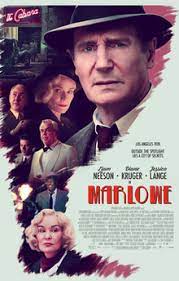
MARLOWE
Ireland/Spain, 2022, 109 minutes, Colour.
Liam Neeson, Diane Kruger, Jessica Lange, Danny Huston, Alan Cumming, Colm Meaney, François Arnaud, Ian Hart, Adewale Akinnuoye-Agbaje, Patrick Muldoon.
Directed by Neil Jordan.
Raymond Chandler’s private eye, Philip Marlowe, has not been on screen since the 1970s. So, here is a 21st-century version, care of the Irish director, Neil Jordan, cowriting with American, William Monahan (The Departed), an Irish production, filmed in Spain, with an Irish lead as Marlowe, and his being given an Irish background. Liam Neeson is Marlowe but, older, resembling the build that Chandler described, but rather world-weary, perhaps a bit too weary.
And the plot is taken, not from a Chandler novel, but by a thousand and 14 novel by Booker-Prize-winning novelist, John Banville, using his pen name for thrillers, Benjamin Black. Which means that the plot is very much Chandler-like as well as a tribute to Chandler’s writing.
A lot of attention has been given to the costumes, decor and sets for this film, quite elaborate. It is Hollywood, the Los Angeles area, 1939. We are taken into the film studios, sequences on set, action sequences. And we are taken into the background of management as well a to the prop rooms, the business offices.
We are also taken into some of the fashionable clubs in Los Angeles, affluent clientele, touches of luxury, but in the background, a cover for prostitution and in the studios as well, a venue for drug distribution.
In this context, a blonde sophisticate, Claire Cavendish, played by Diane Kruger with style, employs Marlowe to find a young man who works on the film sets but who has, allegedly, been killed in a hit run. She is obviously the traditional femme fatale – and, ultimately, lives up to that title. However, Marlowe is also introduced to her mother, a one-time popular actress, Dorothy Conannon – and some welcome scenes and repartee with Jessica Lange, taking charge of each one of them.
Which means and that this is an investigation, getting clues, Marlowe trudging around Los Angeles, contacts with the police, but their letting him go out on his own. There are the owners of the clubs, Danny Huston and Alan Cumming, each confident in their realm, but falling foul of Marlowe and his ingenuity with clues, covering himself, exposing the criminals. For 15 years Liam Neeson has become identified with action films. While he acquits himself adeptly with some tough moves, his Marlowe is not a man of action shows.
Which means also that there is plenty of plot, audiences having to pay attention – although, perhaps, the ending is dramatic but also anticlimactic.
In the past, there have been six actors who played Marlowe, Dick Powell, Humphrey Bogart, Robert Montgomery, James Garner, Elliot Gould, Robert Mitchum. They all had a Hollywood cinema aura about them. Liam Neeson does not have this, with his Irish accent, delivering lines but not in the sharp way that his predecessors did.
For audiences with long memories and who enjoy a touch of exposure, there is a character here, the ambassador to England, his relationship with the actress, his owning the studio, dubious behaviour – in fact, Joseph Kennedy, JFK’s father, was ambassador in England from 1938, more sympathetic to the Nazi regime, not sympathetic to Roosevelt who appointed him. And, Kennedy had a relationship with actress Gloria Swanson. This is obviously not essential to responding to the film but it does indicate how the writers were thinking about Los Angeles and Hollywood at this time.
- The popularity of Raymond Chandler’s books, Philip Marlowe, the many screen versions?
- Los Angeles, 1939, Hollywood and the studios, film sets, prop rooms? Clubs, interiors, decadence? Private eye offices? Atmosphere of the 30s, talk of Roosevelt and World War II, Nazi themes in films?
- Liam Neeson as Marlowe, corresponding to Chandler’s vision of him? Age, build, world-weary, the back story, Ireland, military, police, private eye, office, secretary, clients?
- Clare, glamorous blonde, the visit to Marlowe, playing coy, leading him on? The marriage, brittle, the relationship with Nico, the hit run death, her mother, employing Marlowe, paying him? The various contacts, discussions in the restaurant, her saying she had seen Nico alive?
- Dorothy, actress, relationship with the ambassador, her career, intrigue, relationship with her daughter, with Nico, the discussions with Marlowe? Her being glimpsed in context with the clubs? The final meeting of the three, Claire walking out, leaving Dorothy, but Dorothy furthering her career at the end?
- Marlowe, his investigations, contacts, the police, the dead body, identification, lack of recognition? The discussions with Joe Green and his involvement in the case? The contact with Bernie Ohls, the police, working with Marlowe, letting him do the dirty work, getting the information afterwards?
- The entry into the world of the clubs, meeting Floyd Hansen, his style, to-ing and fro-ing, the connection with Nico, his disappearance outside the club, the jurisdiction on the Road, the later revelation of the drug dealing, Nico bringing the drugs in the antiques, considered as cheap props for the movies? His drugging of Marlowe, Marlowe pretending, being carried by the thugs, finding all the bodies? Overcoming them?
- Lou Hendricks, is chauffeur, drug dealing, the connection with Nico, the drugs from Mexico, distributed in the film studios? Taken by Hanson, tortured?
- Milo getting close, the drugging episode, freeing the chauffeur, the guns, the killing of Hendricks, the killing of Hanson?
- Peterson, alive, the fate his death, with a lookalike? The meeting with Marlowe at his house, the appointment with Claire? Marlowe giving the information, Claire going to the venue, the confrontation with Peterson, his having the documents of all the drug deals? Clare, despising him, shooting him, burning the documents? Marlowe watching?
- Clare, in the office, running the studio, her intentions and ambitions? Marlowe and his acquiescence? His recommending centric for the security guard? His future work as private eye?
Punch/ NZ

PUNCH
New Zealand, 2022, 98 minutes, Colour.
Tim Roth, Jordan Oosterhof, Conan Hayes.
Directed by Welby Ings.
Punch is a New Zealand film, set in a small town.
The film focuses on a 17-year-old, Jim (Jordan Oosterhof) who lives with his father, manual worker, former boxing champion, alcoholic. No sign of wife or mother. The father and son have ambitions for Jim to be a champion boxer, a lot of the film focusing on father training his son, but an antagonism between them, especially because of the drinking. Tim Roth is convincing as the father.
The film is also about gay relationships. One of the characters at school is Maori Whetu (Conan Hayes), taunted at school, condemned as a faggott. He stays alone in a shack out by the sea, hoping to leave the town for Australia, composing songs.
Jim is stung by a jellyfish and Whetu helps him, changing the attitudes in each, their bonding, Jim visiting, becoming more aware of his sexual orientation. But, while Whetu is spurned at school, he is also bashed and raped, hospitalised. This brings out more compassion in Jim and leads to a sexual encounter. Which leads to Jim and his condemnation of homophobia in the town.
Further complications when men in the town want to manage Jim and his fight, offer him a more professional coach, Jim condemning his alcoholic father and moving out – and not knowing that his father has terminal cancer.
Dramatically, the final fight does not go as might have been anticipated, some supporting his father – and a finale with Jim, making music videos, supporting where to as he sings to an appreciative audience.
- The title? Boxing? Domestic violence? Homophobic attacks? The final fight?
- The New Zealand setting, the town, homes, clubs, the countryside, the shack, interiors, the musical score?
- Jim’s story, 17, relationship with his father, his father as a champion boxer, no mother? The initial scenes, the boys and play, the wings, punching with his father? The transition, the ambition to be a boxing success, his explanation to Whetu about what life was like in the ring, his complete control? His father’s drinking, the clashes, the training? School? The girls? Whetu? Jim and his training, along the beach, stripping, running, Whetu and the dog, Jim’s antagonism? In the surf, photography, the jellyfish sting, Whetu helping him, going to the hut, Jim’s gratitude? Returning visits, the bonding between the two, the attraction, the sexual attraction? His confrontations with his father, the managers, the money, the betting, the new coach? Moving out of home? His reaction to the attack on Whetu, the visits to the hospital? Cleaning up the shack? Whetu’s return, the bonding, the affection, the sexual experience, the consequences? Jim and his avoiding Whetu at school, his attempted apology? The burning of the car and his helping? The news of his father’s cancer? The fight, his father’s collapse, getting out of the ring? His continued encouragement of Whetu, the final song, his making the video? His future?
- Stan, past champion, relationship with his son, training him, the fight, the drinking, collapse, the manual work, losing his job? The doctor, the diagnosis, months to live? His not telling Jim? Drinking, giving up? Jim taking on the other coach, moving out? Returning home, lying on the bed? The collapse of the bout?
- Whetu, Maori, gay, school, loner, homophobia, his shack, the decorations, singing, composing? At school and the attacks, faggot? Jim and his disdain, the jellyfish sting, his helping, Jim at the shack, the bonding, the walks, Jim distancing him at school, Whetu hurt? The attack, brutal, the rape? Hospital, leaving hospital, the crutches, back home, Jim, the dog? The bonding, sexual? The revenge on the attackers, the burning of the car? His aim to leave, go to Sydney? The finale, his singing, Jim and the video?
- The clubs, boxing, the training, his father coaching Jim, the other coach, the bets, the demands of the coach, dominating Jim? The fight, Jim leaving the ring?
- School, the girls, the taunting of Whetu in the classroom, the sympathetic teacher trying to help?
- A humane story, family relationships, gay relationships, homophobia? And a sports story?
Lethal White/ CB Strike: Lethal White
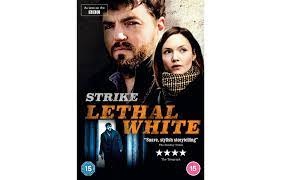
LETHAL WHITE/CB STRIKE: LETHAL WHITE
UK, 2020, 4X 60 minutes, Colour.
Tom Burke, Holliday Grainger, Robert Glenister, Robert Pugh, Kerr Logan, Joseph Quinn, Danny Ashok, Christina Cole, Adam Long.
Directed by Sue Tully.
The third in a series of television versions of the novels by Robert Galbraith, aka J.K. Rowling, quite a series of crime and investigations.
The film is very well-written, incorporating the key elements of the novels into a four hour running time. The central character, Cormoran Strike, alienated son of a famous pop star, his mother having committed suicide, his being in the military, wounded in Afghanistan and losing a leg, failing in relationship with Charlotte his fiancee, setting up as a private eye in central London. He works with Robin, who answers an advertisement and becomes his assistant especially in her engagement to Matthew who does not approve of Strike and Robin working for him.
Tom Burke looks the part of Strike and communicates his eccentric character, his drive, his drinking, his sometimes slovenly living, but his ability to follow clues, interrogate people, draw conclusions. Holliday Grainger also fits the part of Robin particularly well, their making an odd investigative couple.
There is a strong cast in the supporting roles, a lot of interrogations, moving around London.
And quite a complex plot involving a politician, a blackmailer and murder.
- The popularity of the novels by Robert K. Galbraith? The work of JK Rowland? Adaptation of the novels for television? Series?
- The central character of Cormoran Strike, his background, family, relationship with Charlotte and the break, Afghanistan, losing his leg, his return, private investigator? His skills, the previous stories? Age, living in his office, relationship with Lorelei, his inconsistency, using her, her break with him? His dependence on Robin, the years of work with her?
- Robin, the background, University, with Matthew, the relationship, his family, her family, on and off, the rape and its effect on her, the decision to marry Matthew, the film opening with the wedding sequence, her hesitations, Strike’s presence, their talking together? The honeymoon, the ups and downs? Matthew and his disapproval of her work? His behaviour, relationships, with Sarah, Robin finding the hearing? The weekend away? Robin packing, Matthew wanting reconciliation? Her feeling liberated (and the comment to the taxi driver walking away from two marriages)? The visiting the therapist, a panic attack, especially with the closeness of Winn?
- Strike, his methods, following through, on site, interviews, the limitations of his leg and limps? Relying on Robin, in the office, her investigations, going undercover at Parliament, pretending to work as the shop assistant? Their bonding together?
- Billy, his coming to Strike, his mental condition, his story, the drawing of the chalk horse and its repetition, his story about the murder on the eye? His running away, Strike going to find him, on the street, being with his brother, in hospital?
- Jasper Chiswell, minister, arrogant, summoning Strike, the lunch, the discussions, the blackmail, accusing Winn, accusing Jimmy Knight? The tense relationship with his wife? Financial issues? Idolising his dead son (and Strike knowing him, knowing him a bully, generally disliked, his death)? His daughters working for him? His condemnation of Raff? Demanding explanations? The various meetings? Summoning Strike to his house? Found dead?
- Robin going to the internship, the friendship with Izzy, encountering Winn, bugging his office, the discussions? Meeting Raff and the attraction? The encounters with Aamir, in the office, her looking at his phone, the later interrogations, his involvement, protected by Winn, when and his blind wife, the charities, the revelation of win and his fraud, the wife divorcing her husband, protecting Aamir?
- Jimmy Knight, the social group, the meeting at the pub, his speech? Flick as his girlfriend? Tough stances? Jimmy and his hold over Billy? The link with Chiswell, in the past, the dead girl? Strike and Robin following through, the visit to the site, the finding of the bones, the police, the cover up, alleged course plans? Jimmy and the confrontations with Strike? The violence? Jimmy and Flick, the encounter with Robin undercover, the invitation to the party, Robyn searching the room, finding the note? Jimmy discovering the truth, the pursuit?
- The friendship with the detective, giving her information, her giving the details about the case?
We Were Once Kids/ Kids
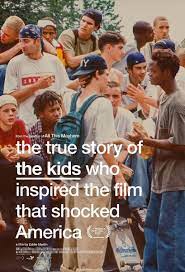
THE KIDS/WE WERE ONCE KIDS
Australia, 2021, 88 minutes, Colour.
Hamilton Harris, Jon Abrahams, Peter Bici.
Directed by Eddie Martin.
In 1995, an unusual drama featuring teenagers, Kids, was a sensation, winning awards and critical acclaim, but a source of contradiction for many groups, social workers, religious concerns. It became a commercial success, talked about, seen by large audiences, discussions, media programs.
Australian documentary director, Eddie Martin (films about skateboarders, street artists, the 2019-2020 bushfires) takes the audience back 26 years but also offers a perspective on the film and the atmosphere of the 1990s, especially in a neighbourhood in New York City.
The film has a great deal of archival footage from the period. Which means that an audience who has not seen the original Kids gets a fair and strong impression of what the film was about, its dramatic cinema style, the issues of the period. There are various footage interviews with film critics such as Roger Ebert who was strongly in favour. There is footage of the director, Larry Clark, a noted photographer who made a number of further films, not without controversy. The writer of the film, Harmony Korine, 19 at the time and from the neighbourhood, is glimpsed in the footage from the past. Clark and Korine declined to be interviewed for this documentary.
In the present, there is continued interview and narrative from one of the teenage stars of the original film, Hamilton Harris. He is co-producer of the film, wanting to have his say and perspective about what it was like to make the film, and the contact with fellow actors, especially Justin Pierce (who won some awards for his performance) and Harold Hunter. There is extensive footage of each of these young men, during the making, the aftermath, ambitions careers, success, death and suicides.
One criticism of this documentary is that the prominent stars, Rosario Dawson, Chloe Sevigny, Leo Fitzpatrick, were not interviewed (a glimpse or two of Rosario Dawson in past footage). The comment is made by the locals that the film was mainly about those who lived in the neighbourhood, amateurs, whereas the three stars were brought in from the outside, not part of the daily life dramatised in the film.
The picture of teenagers in New York is frank, the role of drugs and alcohol, sexual relationships, in the background of some poverty and lack of education. The invitation to become part of a feature film was attractive to these young people. Some money. There was criticism of the time and certainly afterwards that the filmmakers were exploiting them. With the footage and the contemporary interviews (especially by other stars of Kids who have survived and had careers, Jon Abrahams, Peter Bici, reminiscing about their lives, the film, the making, and the relationships with Pierce and Hunter).
There is a surprising discovery at the end of the film, an Australian who, after a long time, discovers that he is the father of Justin Pierce.
This documentary suggests that audiences might well go back to see Kids again or for the first time, comparing the picture of life in the neighbourhood in the 1990s with pictures of life there in succeeding decades. How much change, or not? And the same issues for teenagers and challenges?
One of the strong criticisms of the film at the time was: where the parents? They are notably absent in the original film – and the question of what life would be like for those participating if there had been some kind of adult guidance and/or control.
This is an interesting social documentary. It is also a must for those who love the movies and are intrigued by the backgrounds.
Kids
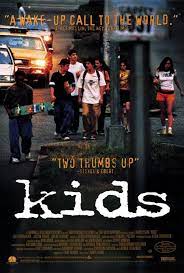
KIDS
US, 1995, 95 minutes, Colour.
Leo Fitzpatrick, Justin Pierce, Chloe Sevigny, Rosario Dawson, Harold Hunter, Hamilton Harris, Harmony Korine, Peter Bici, Jon Abrahams.
Directed by Larry Clark.
Kids is a small-budget feature, written and directed by Larry Clark. It has been much argued about. There has been some controversy in the US and the UK as to whether it should be banned or not. With the 26th December release of the film around Australia (a time when there is very little political news because of the beginning of the summer holidays), the media has reported on the film's controversial subject and style.
Many audiences have found it too confronting with its picture of New York lower middle-class teenagers who lack any moral sense and who are enmeshed in the drug culture and whose ambitions peak at irresponsible and self-gratifying sex.
At a Melbourne preview some social workers stated that these kids were exactly like some at our own remand centres. It is easy to be horrified and denounce Kids. But, we cannot gloss over the more desperate sides of our society and the efforts of so many to reach out in generous and often seemingly fruitless help.
The complex world we live in and the moral questions that are raised are often well dramatised in films. While films are generally seen as entertainment of the relaxing kind, they have a strong place in mirroring our world and offering us an entertainment that also educates.
Many older audiences (and some young ones) were brought up in a religious world where it was thought everybody should behave practically perfectly and we set ourselves ideal standards. We were very disedified when these were not put into practice, but we were protected, in those days, from a world that was frequently amoral. And many of us have come to expect that films should portray an edifying world and are often wary of stories that present us with characters who do not share our values.
But our Christian discipleship and our concern for all and, especially, those who are oppressed in any way should take us into an experience of the arts that shows us this world and these characters, shows us the struggles and the searches, shows us the ugliness and the sin so that we appreciate the profound sadness and despair, the temptations, falls. We need delicate but robust sensitivity.
While the treatment is graphic (more verbal than visual) and the behaviour of the teenagers will shock many audiences, the film reflects a part of today's society and its moral problems and makes a plea for change (especially to parents).
In the U.S. where the ratings are based on a voluntary code, Kids did not receive a rating (thus avoiding the NC which requires anyone under 17 to see the film in the company of an adult) and was left to the discretion of the cinema managers.
The film has received an R 18+ classification in Australia. This means that those under 18 are not admitted by law. It might have been more helpful had the film been available to teenagers with adults who might then discuss the issues. An MA 15+ classification would have enabled this as it allows those under 15 to see the film in the company of an adult.
1995 and controversy, some personal background.
The press release for Kids was the first of my press releases, issued as 'A Statement from the Australian Catholic Film Office'. A reporter for the Melbourne Sun had made contact with a number of Christian offices, inviting representatives to a preview screening of Kids. Its director, Larry Clark, a photographer, allegedly had a history of drugs. His film was about kids in the New York streets indulging in drugs and sex, running the risk of HIV infection.
At the discussion after the screening, it appeared that all the Church people the journalist had invited were not going to condemn the film at all. Instead, a number of pastoral care and social workers who belonged to more evangelical churches,
especially the Baptists, while not enjoying the film, said that it was a fair representation of what they found amongst some kids on the streets of Melbourne. The journalist was not impressed, left in a huff and no article ever appeared.
In the meantime, the Melboure Age asked the Communications Office for a comment. It was the week before Christmas with Kids due to be released on Boxing Day. A bit of a slow week for stories, but someone had heard of the preview we attended.
I wrote the following statement. The Age headed the report, 'Support for Kids from unexpected source' (or words to that effect) stating that the Catholic church had lent its support to Kids. That was not exactly the case! The Age journalist faxed through the article and changed a couple of things at my suggestion. (I have found when journalists realise you know what you are talking about, they pay attention.)
The ABCs 7.30 report had some footage of interviews with Larry Clark when he had promoted the film some weeks earlier. They had a brainwave to make a seven minute feature, going to cinemas to ask patrons, especially the young, whether they liked it or not. The interviewees tended not to have liked it. There were bits of Larry Clark. And some fair bits of me sitting at home trying to say that these were issues we had to face whether we liked it or not but that not everybody needed to see this particular version of kids and drugs.
As always, I sent my releases to Brussels. Guido Convents printed it early in 1996. It was the period of the centenary of cinema and the publication of the list of movies recommended by the Pontifical Council for Social Communciations (and, therefore, according to journalists, by the Pope).
The British Film Institute's magazine, Sight and Sound, published an editorial on Church interest in cinema. The editorial was initially taking a shot at the doyen of British reviewers, author Alexander Walker, of the Evening Standard (though they did not mention him and his condemnatory remarks about Kids by name). The editorial then went on to praise the Catholic Church and its stances. At the same time, Derek Malcolm, veteran reviewer for The Guardian, asked about ten representatives of the churches in England for their lists of excellent films to compare them with those from the Vatican. He was impressed by the Catholic list - enough to make one seriously think of becoming a Catholic!
However, the Sight and Sound editorial, 'Fallible Judgments', included these paragraphs.
Kids has prompted this moral controversy partly by raising the troubling issue of adolescent sex, something society's Moral Guardians, especially the Church, have traditionally felt the need to deplore. So it is ironic that certain elements in the Catholic Church are demonstrating a far more generosity towards Kids than these secular commentators. In a forthcoming issue of Cine & Media, published by OCIC (Organisation Catholique Internationale du Cinema et de l'Audiovisuel), Father Peter Malone writes in Kids' defence, noting that 'while the treatment is graphic (more verbal than visual) and the behaviour of the teenagers will shock many audiences, the film reflects a part of today's society and its moreal problems and makes a plea for change (especially to parents).'
The editorial then refers to the Vatican's 100 films for the centenary of cinema and (rightly) notes that the list did not come from the Pope but from Msgr Enrique Planas in a booklet distributed to Italian schools to encourage media literacy.
Then another mention:
Nevertheless the Pontifical rubber stamp indicates (in the words of the Catholic Herald) that 'the Vatican is now acknowledging the beneficial effect that films can have on the lives of their audiences,' a view already endorsed by such open-minded clerics as Father Malone. This is in marked contrast to the Christian fundamentalist groups in the United States who have lobbied against films deemed offensive to their principles. One group even runs a hotline which anxious filmgoers can ring and find out how much swearing, violence or sex a particular film contains. Kids was a notable recent target of these groups...
As the abuse of Kids gathers momentum over the next few weeks, it will be interesting to see whether British religious groups jump on the banning bandwagon or show the intelligence of their Catholic brothers and sisters.
Alexander Walker was not impressed by their treatment of him, "even trimming a film like Kids in order to sanitise a censor's conscience and make possible a distributor's profit cannot remove the way in which almost the whole emphasis of interest is placed on apparent minors aping the lasciviousness and debauchery of adults". The editorial did not refer to him by name, mentioning only The Evening Standard. He immediately penned a reply. Sight and Sound headed it 'Ego te absolve'.
Your editoritorial (S&S April) gives a source for the adverse quotation you use (Evening Standard) but names no author for it. This is sloppy journalism and, since the passing of the Copyright, Designs and Patents Act, an unlawful denial of the writer's right to be named when his or her work is being cited in a text. In the film's defence you quote (and this time name) one Father Malone. You clearly place great faith in the heterodoxy of Roman Catholic clerics. You will therefore understand my surpirse at the anathema my own name continues to cause you when you quote from my writings - as you again did several issues ago - without any authorial attribution. I suggest you discontinue this practice, lest it blind you to the requirements of scholarly discussion, and I shall absolve you from this sin of omission, imnposing on you only the penance of three Hail Mary's to be said on your knees when reading the review of kids which, deo volente, shall appear in the Evening Standard when the film opens.
So, for the fun of it, a letter to the editor.
20 July 1996
Dear Editor,
I thought I would make myself known after reading your kind words in the editorial of April on the Catholic Church's approach to films and your quoting me about Kids. My June copy of Sight and Sound has just arrived and I see a rather detrimental comment about heterodox clerics from Alexander Walker - so I thought I would send you a `Letter to the Editor'.
In fact, I am the director of the Australian Catholic Film Office for the Bishops of Australia as well as the President of the Catholic Film Offices of the Pacific and a member of the International Board of Directors of O.C.I.C. (International Catholic Organization for Cinema and Audio-Visuals). So, `heterodox' sounds somewhat over the top. But before that I have been a regular reviewer of films since 1968 in religious publications as well as newspapers and Cinema Papers and written a number of books. In fact, in the post yesterday was an invitation to write the entry on `Religion' for The Oxford Companion to Australian Film.
I have appreciated The Monthly Film Bulletin and, now, Sight and Sound for my work.
Sincerely,
I had the opportunity to go to the Venice Film Festival a month later and wondered whether I would meet Mr Walker. David Stratton of SBS and The Australian mentioned that he had seen the letter - and added that Alexander Walker was not attending the festival as he had had a car accident, knocked down by a taxi!
On moving to England in 1999, I made myself known to him and he wished me well in my work.
______________________________________________
THE KIDS/WE WERE ONCE KIDS
Australia, 2021, 88 minutes, Colour.
Hamilton Harris, Jon Abrahams, Peter Bici.
Directed by Eddie Martin.
In 1995, an unusual drama featuring teenagers, Kids, was a sensation, winning awards and critical acclaim, but a source of contradiction for many groups, social workers, religious concerns. It became a commercial success, talked about, seen by large audiences, discussions, media programs.
Australian documentary director, Eddie Martin (films about skateboarders, street artists, the 2019-2020 bushfires) takes the audience back 26 years but also offers a perspective on the film and the atmosphere of the 1990s, especially in a neighbourhood in New York City.
The film has a great deal of archival footage from the period. Which means that an audience who has not seen the original Kids gets a fair and strong impression of what the film was about, its dramatic cinema style, the issues of the period. There are various footage interviews with film critics such as Roger Ebert who was strongly in favour. There is footage of the director, Larry Clark, a noted photographer who made a number of further films, not without controversy. The writer of the film, Harmony Korine, 19 at the time and from the neighbourhood, is glimpsed in the footage from the past. Clark and Korine declined to be interviewed for this documentary.
In the present, there is continued interview and narrative from one of the teenage stars of the original film, Hamilton Harris. He is co-producer of the film, wanting to have his say and perspective about what it was like to make the film, and the contact with fellow actors, especially Justin Pierce (who won some awards for his performance) and Harold Hunter. There is extensive footage of each of these young men, during the making, the aftermath, ambitions careers, success, death and suicides.
One criticism of this documentary is that the prominent stars, Rosario Dawson, Chloe Sevigny, Leo Fitzpatrick, were not interviewed (a glimpse or two of Rosario Dawson in past footage). The comment is made by the locals that the film was mainly about those who lived in the neighbourhood, amateurs, whereas the three stars were brought in from the outside, not part of the daily life dramatised in the film.
The picture of teenagers in New York is frank, the role of drugs and alcohol, sexual relationships, in the background of some poverty and lack of education. The invitation to become part of a feature film was attractive to these young people. Some money. There was criticism of the time and certainly afterwards that the filmmakers were exploiting them. With the footage and the contemporary interviews (especially by other stars of Kids who have survived and had careers, Jon Abrahams, Peter Bici, reminiscing about their lives, the film, the making, and the relationships with Pierce and Hunter).
There is a surprising discovery at the end of the film, an Australian who, after a long time, discovers that he is the father of Justin Pierce.
This documentary suggests that audiences might well go back to see Kids again or for the first time, comparing the picture of life in the neighbourhood in the 1990s with pictures of life there in succeeding decades. How much change, or not? And the same issues for teenagers and challenges?
One of the strong criticisms of the film at the time was: where the parents? They are notably absent in the original film – and the question of what life would be like for those participating if there had been some kind of adult guidance and/or control.
This is an interesting social documentary. It is also a must for those who love the movies and are intrigued by the backgrounds.
Friday photos – more, around the Province.
Friday photos – more, around the Province.

Bob Irwin and Phil Hicks celebrate their Golden Jubilee at Kensington – and plunge the knife into their photo.

Kimi is at a meeting in Rome reflecting on initial formation. The glimpse is at bottom left.
John Walker’s eye and lens see Kensington Monastery from a different angle and colour.
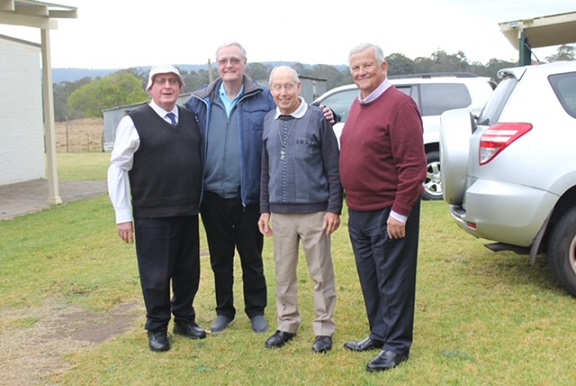
Many older MSC remember Fil Pelingon MSC who studied at Croydon, served as General Bursar, headed CFA, The Commuinication Foundation for Asia (the media flagship in the congregation)
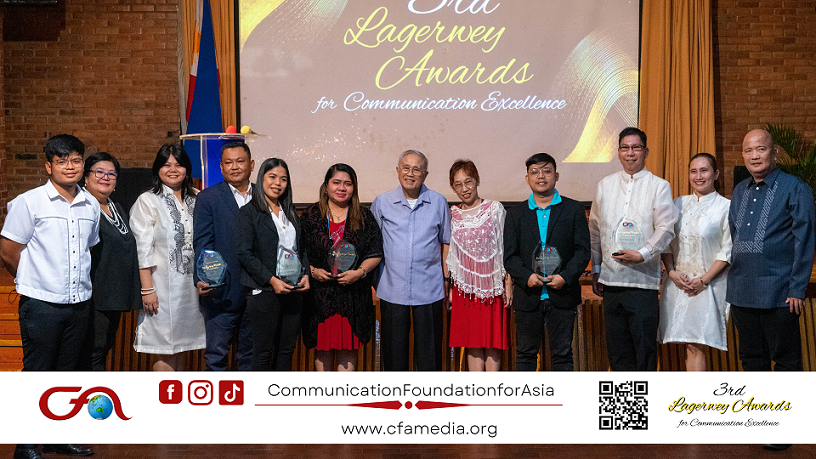
The Chevalier Institute relaxes

Henk Bosman and Noel Mansfield relax with an outing from St Joseph’s

Vietnamese delegates to the Chapter visit the Heart of Life Centre

Chris Chaplin MSC visiting the Korean Province, Blessing the new Province house.
Chris Chaplin MSC visiting the Korean Province, Blessing the new Province house.

Chris Chaplin blessing – and a picture of the intended house.

The blessing was of the new province house which is being built for the Korean Province for their members and administration,

the former province house located in Seoul is being replaced by this new building.
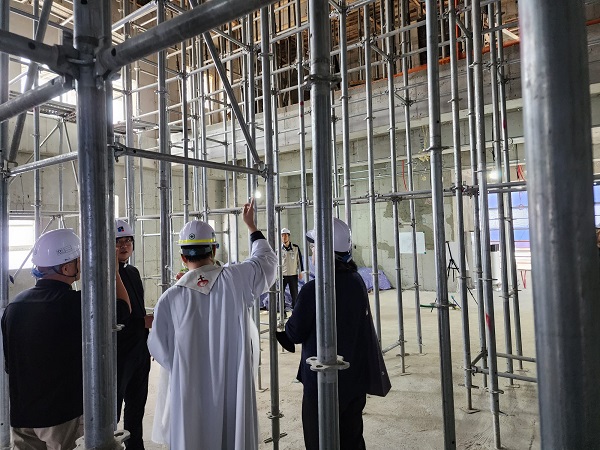
The administration is currently operating from the former novitiate house in Paju-si outside Seoul.
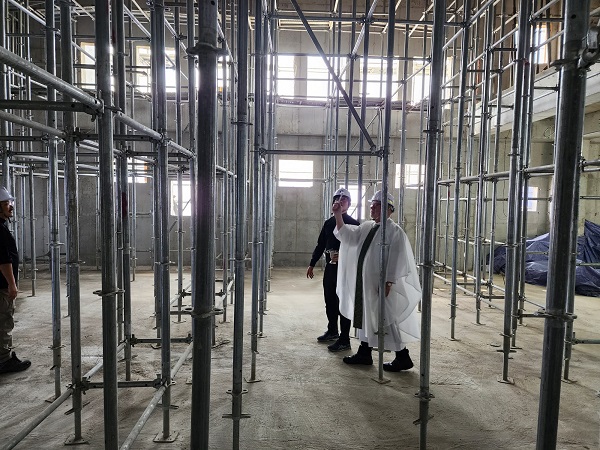
The new building in Goyang-si, Gyeonggi-do is designed around caring for the future of the province as the more senior members age and have health concerns, and for the emerging needs of the Administration.
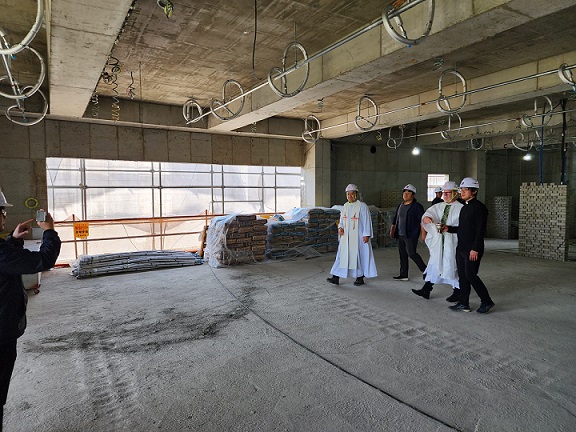
It is a beautiful design and location.
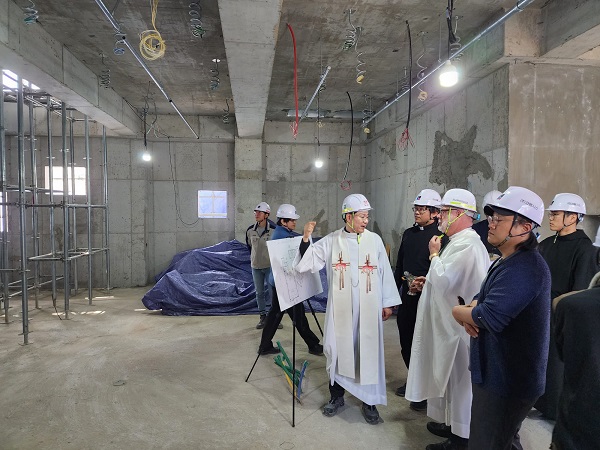
You can follow the photo-record of the blessing – without wearing your hard hat..
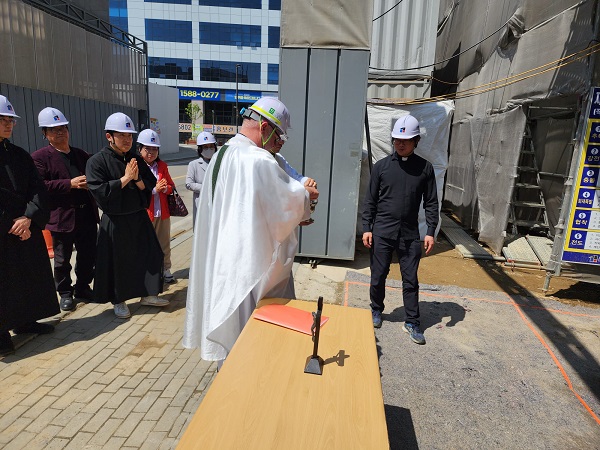
Mission accomplished
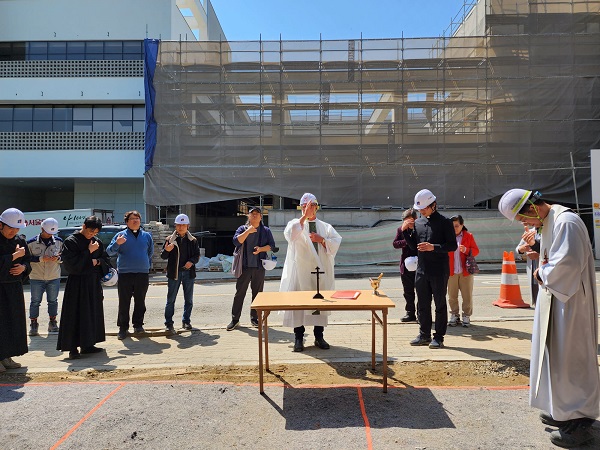
And, all together
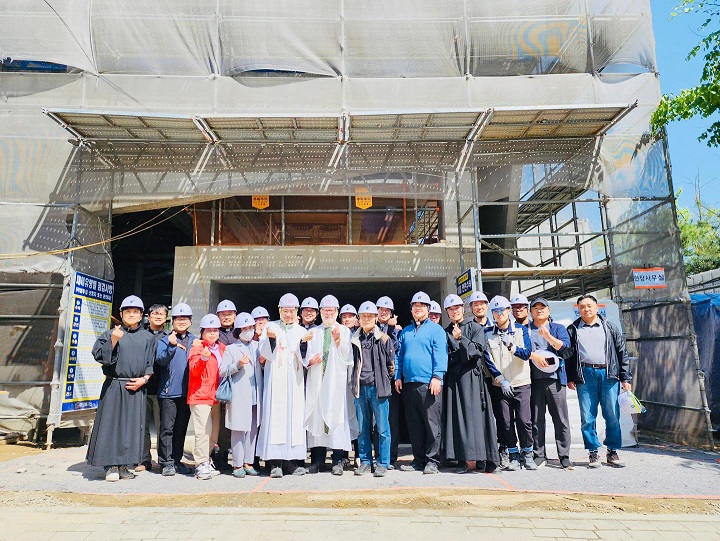
Lost Transport, The
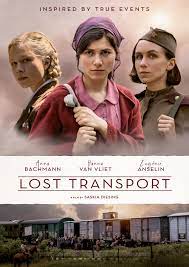
THE LOST TRANSPORT
Netherlands/Luxembourg/Germany, 2022, 100 minutes, Colour.
Hanna van Vliet, Eugenie Anselin, Anna Bachmann, Bram Suljker.
Directed by Saskia Diesing.
There is always another story to be told, even after 80 years and more, about World War II, about the Holocaust and the concentration camps. This is one of those stories, horrific in its background, hopeful in its humanity.
The setting is early 1945. The Russians have advanced into Germany, the prisoners in Auschwitz have to be moved, three trains moving west into Germany. This film is the story of one of those trains, stopped in a small German village, the starving and suffering Jewish prisoners desperate, travelling into the unknown, then stranded almost in the middle of nowhere.
While a lot of attention is given to the broad drama, the number of prisoners on the train, the need for food, their getting out of the train, their German overseers fleeing, Russian troops entering the village, a search in the shops and houses for food, the film focuses on one couple from the transport, Simone and Isaac, from Holland, eager to find a way home. There is a severe complication in terms of illness amongst the prisoners, Isaac succumbing, Simone wanted to care for him, reluctantly allowing him to go to the hospital for care.
But, in fact, this is the story of three women, antagonisms, bonding. Simone is a very strong character, determined to get home to Holland, loving Isaac, caring and protecting him. The next character is Vera, a Russian soldier, strong-minded, with the Russian ethos, having to make decisions about the village, about the transport sufferers. There is interaction with Simone, sometimes hard, sometimes brittle, but, ultimately, Vera’s humanity coming through, breaking through the letter of regulations.
The third character is Winnie, a young German teenager from the village, arrogant about the war, about Hitler, never dreaming that the war would come to an end with Germany’s defeat. She and her friends are very sure of themselves but as the transport arrives, the refugees coming into the town searching for food, she starts with a severe resistance. And, there is a focus on Simone as she and Isaac move into Winnie’s house. And, she encounters Vera’s severity with the occupying Russians.
We see the slow change in each of the women, their dramatic interactions, their more human interactions, Simone becoming more accepting, Vera questioning the severity of her ideology, Winnie having to accept defeat, except hardships, and bond with the two women.
This is the kind of story of World War II that is always relevant.
- The title, the episode, the evacuation of Auschwitz, the transports, the trains and their journeys?
- Audiences and Holocaust stories, Auschwitz stories, like in the concentration camps, the freeing of the camps, the plight of the prisoners, refugees? The German guards, their abandoning the prisoners?
- 1945, the ending of the war, the atmosphere, the camps, the SS, the trains, the condition of the prisoners, the Jews from all over Europe? The defeat of the Nazis, the end of the war?
- The village, remote from Berlin, the people, their way of life, German superiority, the reverse?
- The transport, stuck in the countryside, the number of refugees, audience empathy? Being abandoned, uncertainties, the need for food, going into the village, the response of the local people, finding food, going into the homes? Later illness and its spread, doctors, treatment, hospitalisation and quarantining?
- The focus on Simone and Isaac, their background, Holland, together, Simone venturing into the town, finding the food, I sack and support, his illness, Simone and shielding him in the house, his having to move into quarantine, treatment, her visits, death?
- The focus on Winnie, teenager, German, her friends, arrogant, reaction to the prisoners, sabotage, her house being occupied, Simone and Isaac, his illness, the reversal of roles, her being hungry? Her changing attitudes?
- The Russians, the focus on Vera, her role, the other officers, interactions, the Russian ethos, communist background, the role in the war, Stalin, the Nazis? Penetrating further into Germany, the liberation of Germany, the concentration camps?
- Vera, her role, military, becoming more humane, the interactions with Simone, with Winnie, the challenges to her compassion, especially with Isaac’s illness?
- The bonding of the three women, unlikely before this episode, the mellowing of each of them, Vera and her breaking through regulations, Winnie and her being treated well and learning compassion, Simone, the crisis with Isaac, her final decision, to return to Holland?
- A compassionate story, the story of three different women in war?

